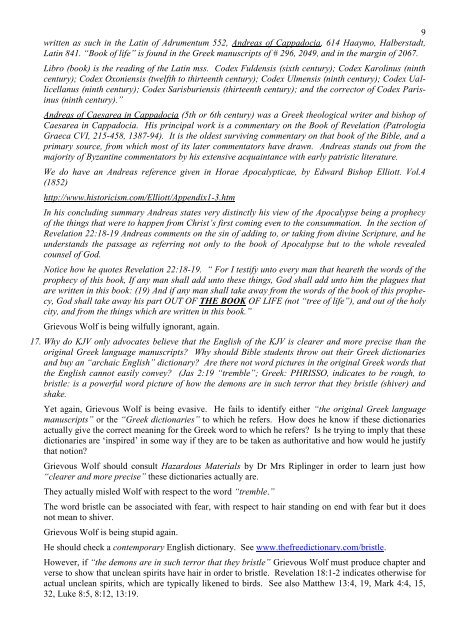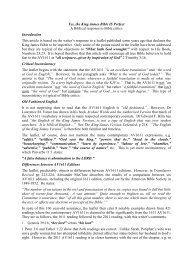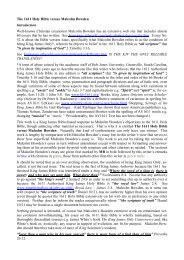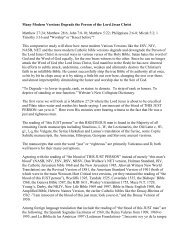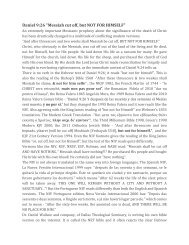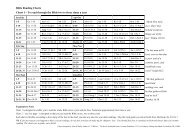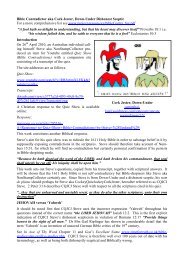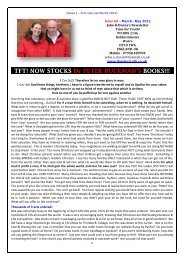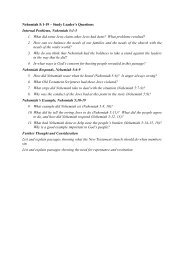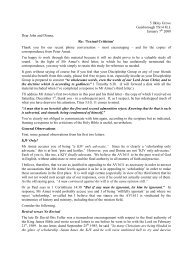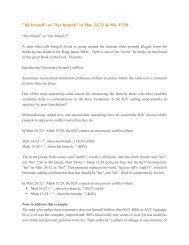A Grievous Wolf - Time for Truth
A Grievous Wolf - Time for Truth
A Grievous Wolf - Time for Truth
Create successful ePaper yourself
Turn your PDF publications into a flip-book with our unique Google optimized e-Paper software.
9<br />
written as such in the Latin of Adrumentum 552, Andreas of Cappadocia, 614 Haaymo, Halberstadt,<br />
Latin 841. “Book of life” is found in the Greek manuscripts of # 296, 2049, and in the margin of 2067.<br />
Libro (book) is the reading of the Latin mss. Codex Fuldensis (sixth century); Codex Karolinus (ninth<br />
century); Codex Oxoniensis (twelfth to thirteenth century); Codex Ulmensis (ninth century); Codex Uallicellanus<br />
(ninth century); Codex Sarisburiensis (thirteenth century); and the corrector of Codex Parisinus<br />
(ninth century).”<br />
Andreas of Caesarea in Cappadocia (5th or 6th century) was a Greek theological writer and bishop of<br />
Caesarea in Cappadocia. His principal work is a commentary on the Book of Revelation (Patrologia<br />
Graeca CVI, 215-458, 1387-94). It is the oldest surviving commentary on that book of the Bible, and a<br />
primary source, from which most of its later commentators have drawn. Andreas stands out from the<br />
majority of Byzantine commentators by his extensive acquaintance with early patristic literature.<br />
We do have an Andreas reference given in Horae Apocalypticae, by Edward Bishop Elliott. Vol.4<br />
(1852)<br />
http://www.historicism.com/Elliott/Appendix1-3.htm<br />
In his concluding summary Andreas states very distinctly his view of the Apocalypse being a prophecy<br />
of the things that were to happen from Christ’s first coming even to the consummation. In the section of<br />
Revelation 22:18-19 Andreas comments on the sin of adding to, or taking from divine Scripture, and he<br />
understands the passage as referring not only to the book of Apocalypse but to the whole revealed<br />
counsel of God.<br />
Notice how he quotes Revelation 22:18-19. “ For I testify unto every man that heareth the words of the<br />
prophecy of this book, If any man shall add unto these things, God shall add unto him the plagues that<br />
are written in this book: (19) And if any man shall take away from the words of the book of this prophecy,<br />
God shall take away his part OUT OF THE BOOK OF LIFE (not “tree of life”), and out of the holy<br />
city, and from the things which are written in this book.”<br />
<strong>Grievous</strong> <strong>Wolf</strong> is being wilfully ignorant, again.<br />
17. Why do KJV only advocates believe that the English of the KJV is clearer and more precise than the<br />
original Greek language manuscripts? Why should Bible students throw out their Greek dictionaries<br />
and buy an “archaic English” dictionary? Are there not word pictures in the original Greek words that<br />
the English cannot easily convey? (Jas 2:19 “tremble”; Greek: PHRISSO, indicates to be rough, to<br />
bristle: is a powerful word picture of how the demons are in such terror that they bristle (shiver) and<br />
shake.<br />
Yet again, <strong>Grievous</strong> <strong>Wolf</strong> is being evasive. He fails to identify either “the original Greek language<br />
manuscripts” or the “Greek dictionaries” to which he refers. How does he know if these dictionaries<br />
actually give the correct meaning <strong>for</strong> the Greek word to which he refers? Is he trying to imply that these<br />
dictionaries are ‘inspired’ in some way if they are to be taken as authoritative and how would he justify<br />
that notion?<br />
<strong>Grievous</strong> <strong>Wolf</strong> should consult Hazardous Materials by Dr Mrs Riplinger in order to learn just how<br />
“clearer and more precise” these dictionaries actually are.<br />
They actually misled <strong>Wolf</strong> with respect to the word “tremble.”<br />
The word bristle can be associated with fear, with respect to hair standing on end with fear but it does<br />
not mean to shiver.<br />
<strong>Grievous</strong> <strong>Wolf</strong> is being stupid again.<br />
He should check a contemporary English dictionary. See www.thefreedictionary.com/bristle.<br />
However, if “the demons are in such terror that they bristle” <strong>Grievous</strong> <strong>Wolf</strong> must produce chapter and<br />
verse to show that unclean spirits have hair in order to bristle. Revelation 18:1-2 indicates otherwise <strong>for</strong><br />
actual unclean spirits, which are typically likened to birds. See also Matthew 13:4, 19, Mark 4:4, 15,<br />
32, Luke 8:5, 8:12, 13:19.


